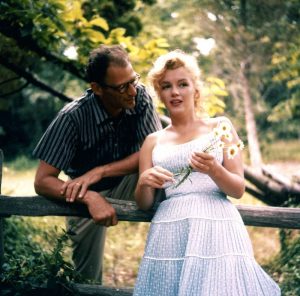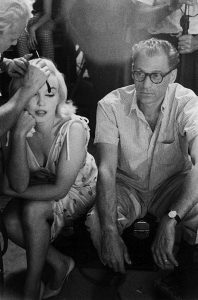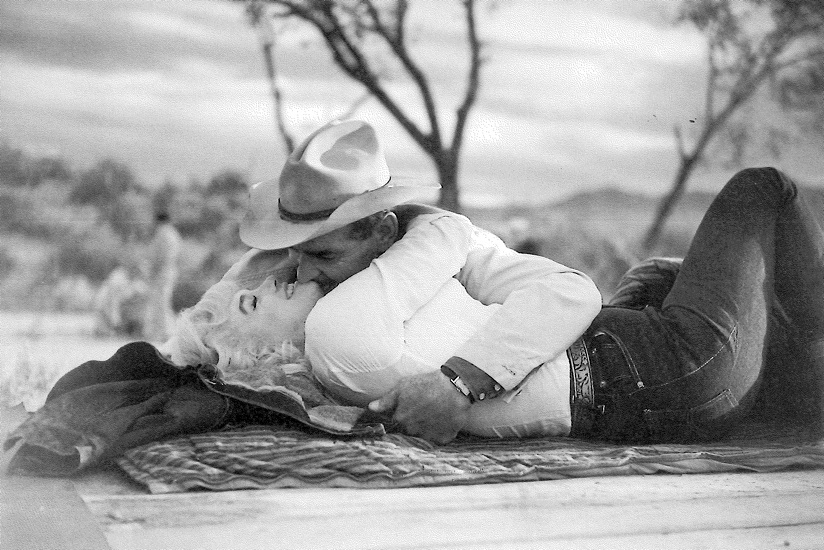
Artists in Love is a ten-part documentary series, produced in Italy for the satellite channel Sky Arts, and first broadcast in 2016. Among the famous couples profiled are the Mexican artists, Frida Kahlo and Diego Rivera; opera singer Maria Callas’s tortured relationship with shipping magnate Aristotle Onassis; plus singers Johnny Cash and June Carter, and filmmaker Federico Fellini and his actress wife, Giulietta Masina.
The eighth episode features Arthur Miller and Marilyn Monroe. Like the rest of the series, it is presented by the English actress Samantha Morton, who played a Monroe impersonator in the 2009 film, Mister Lonely. “Marilyn, like me, was brought up in foster care,” she said at the time, “so I knew what it was like not to feel safe and secure.” The eloquent guest speakers include two of Monroe’s biographers, Carl Rollyson and Michelle Morgan, and Stephen Marino, founder of the Arthur Miller Society.

Happy times early in the Monroe-Miller marriage.
When Arthur and Marilyn married in 1956, they were dubbed ‘the egghead and the hourglass’ by the press. However, a closer examination of their backgrounds shows they were not as different as it might appear. Both grew up during the Great Depression, and were late developers. Neither was an exceptional student: Arthur was athletic but showed no literary ability until he studied Dostoyevsky’s The Brothers Karamazov for a high-school book report. He would recommend this novel to Marilyn, then on the cusp of stardom, when they first met in 1951.
Although there was an instant attraction, Arthur was already married with two young children. They corresponded for a while after he returned to New York. “I didn’t see him for about four years,” Marilyn recalled. “I used to think he might see me in a movie and I wanted to do my best because he had said he thought I ought to act on the stage. People who were around and who heard him, laughed, but he said, ‘No, I’m very sincere.’”
Arthur’s respect for Marilyn, and his refusal to exploit her sexually, were a contrast to the rampant misogyny in Hollywood and a mainstay of her regard for him. After she moved to New York in 1955, their romance began in earnest. Arthur, a Pulitzer-winning playwright and the toast of Broadway, was nonetheless unprepared for Marilyn’s immense fame. When he impulsively announced their engagement to the press, it came as a surprise even to her.
Over the next few years, Marilyn came closer to enjoying a settled domestic life than she had ever known. But there were tensions from the beginning, with Arthur facing creative stasis while Marilyn supported him financially. Only weeks after the wedding, Arthur is said to have expressed his frustration in a journal, which Marilyn found laid open on his desk. The gulf between his idealised love for Marilyn and the complicated reality of her struggles within the star system was difficult to bear.

On the set of The Misfits
For her part, Marilyn was desperate to have children – a lack she felt deeply – and still scarred by her own past trauma. Arthur tried to cope with his wife’s emotional distress but was disturbed by her growing addictions. By the time they worked together on one of her finest films, The Misfits, their marriage was nearly over. There is a lingering sense that both were ultimately disenchanted with each other.
Miller has been criticised for not attending Marilyn’s funeral in 1962, but he can hardly be blamed for wanting to put this unhappy experience behind him. Perhaps a more interesting quandary is how Marilyn might have responded to his portrait of the doomed Maggie in his 1964 play, After the Fall, which he had conceived during their marriage. The ghost of Marilyn would loom over his later plays, and he wrote searingly about her in his autobiography, Timebends. Public interest in this bittersweet love story shows no sign of abating, and his daughter Rebecca Miller (born after Marilyn died, to his third wife, Inge Morath) has recently completed a feature-length documentary, Arthur Miller: Writer.
Artists in Love is certainly one of the better documentaries about Marilyn’s life, although there are a few misunderstandings along the way. Some Like It Hot (1959) is chronologically misplaced before The Prince and the Showgirl (1957), for example. A famous quote from Rita Hayworth (‘Every man I have ever known has fallen in love with Gilda, and awakened with me’) is wrongly attributed to Marilyn. More seriously, her drinking problem is exaggerated, and it is even suggested that this may have caused her to lose a baby. In fact, the primary cause of her miscarriages was endometriosis. The dangers of drinking in pregnancy were not widely known at the time, and while Marilyn did sometimes drink to excess, her greatest dependency was on the drugs prescribed by her trusted doctors.
Nonetheless, Samantha Morton’s parting words are affecting. “Did Marilyn give up on herself before age could make her wiser?” she asks. “Did Miller give up on her without giving her a chance to change? Or did they both fear the inevitable ruin of the glimmering and enchanting image she presented to the world?”






